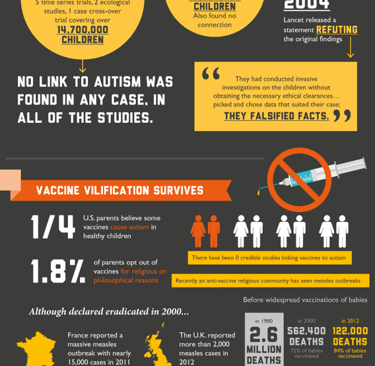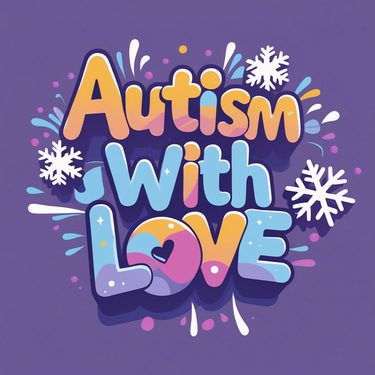Autism and Vaccines: Busting Myths and Shutting Down the Lies
Let’s talk about one of the most stubborn, dangerous rumors of the last few decades: the idea that vaccines cause autism. If you’ve ever found yourself spiraling down a Facebook thread, watched a YouTube video “they don’t want you to see,” or overheard someone in the supermarket going off about “toxins in vaccines,” chances are you’ve come across this myth.
AUSTISM SUPPORT
W.Love
4/14/20254 min read


It’s time to set the record straight.
The Rumor That Just Won’t Die
It all started in 1998 when a British doctor named Andrew Wakefield published a study in The Lancet, a respected medical journal. His claim? That there was a connection between the MMR vaccine (measles, mumps, and rubella) and autism in children. Naturally, parents freaked out. The idea that a shot meant to protect your child could cause something as serious as autism was terrifying.
But here's the catch: Wakefield's study was deeply flawed. Seriously, next-level flawed.
It wasn’t based on statistics.
There was no control group.
It relied on people’s memories (which, let's be honest, are fuzzy even when trying to remember what we had for lunch).
And it made conclusions that weren’t even statistically valid.
By scientific standards, it was a hot mess.
The Fallout
Even though the study was garbage, the media ran with it. Anti-vaccine groups latched onto it like it was gospel, and parents around the world were left in panic mode. It wasn’t until years later—after countless studies and expert reviews—that we realized just how wrong Wakefield had been.
In fact, the truth was even worse: not only was his study incorrect, it was deliberately misleading. In 2004, The Lancet officially retracted the study, and it came out that Wakefield had conducted invasive procedures on children without proper ethical approval. He had cherry-picked data to fit his theory and, yes, he falsified facts.
The Real Science
Let’s pause here for a second and talk about actual science — because it’s extensive and, quite frankly, unshakeable.
Since 1998, multiple studies from all around the world have looked into this claim. The verdict?
No connection between vaccines and autism. Zero. Zilch. Nada.
If we break it down:
1999: A study of 500 children—no connection.
2001: A study of 10,000 children—still no connection.
2002: A Danish study with 537,000 children—nothing.
2002 again: A Finnish study with 535,000 children—still nothing.
2004: The Lancet officially debunks Wakefield’s claims.
2005: A review of 31 studies covering more than 10 million children—no link.
2012: The mother of all reviews—27 cohort studies, 17 case-control studies, 5 time-series trials, and more,
covering 14.7 million children. Guess what? No link.
The conclusion? Vaccines don’t cause autism. In any case. In any of the studies.
But The IS Damage Done
Despite this mountain of evidence, the damage from Wakefield’s study has been massive. A quarter of U.S. parents still believe vaccines might cause autism. Almost 2% opt out of vaccinating their kids for religious or philosophical reasons. And thanks to this vaccine hesitancy, diseases that were nearly eradicated—like measles and whooping cough—are making terrifying comebacks.
France saw a measles outbreak with 15,000 cases in 2011. The U.K. had over 2,000 cases in 2012. In the U.S., whooping cough skyrocketed to nearly 50,000 cases in 2012. And according to a study, that outbreak was directly tied to people refusing vaccines. You all know about the measles outbreak here in Texas right now in 2025.
What’s worse? These diseases kill. Before widespread vaccinations, 2.6 million people died from measles each year. Vaccines brought that number way down—to 122,000 in 2012. That’s a huge difference.
Why Parents Are Still Scared
You can’t totally blame parents for being cautious. The internet has created a wildfire of misinformation. And some vaccine myths just sound scary—especially when they’re wrapped in scientific-sounding language.
Here are a few examples of myths that still trip people up:
“Vaccines are full of toxic chemicals.”
Most people point to thimerosal, a preservative that contains mercury. But it's only ever been used in small amounts and is no longer present in most vaccines. And even when it was used, there was no evidence it harmed children.“It only affects my child.”
Not true. Unvaccinated kids put others at risk—especially babies too young for vaccines and people with weakened immune systems.“Too many vaccines at once will overload a baby’s system.”
Babies’ immune systems are built to handle way more than vaccines. Every day, they’re exposed to thousands of germs from the air, their food, and their surroundings.“Drug companies just want to make money.”
Sure, pharma companies make money, but vaccines only make up 2–3% of the total pharmaceutical market. It’s not some secret goldmine.“It’s better to get the disease naturally.”
Not when those diseases kill people. There’s no virtue in risking your child’s life over something preventable.
So What Does Cause Autism?
Here’s the thing—autism is complex. It’s a neurological and developmental condition that affects how people interact with others, communicate, and experience the world. We don’t fully understand what causes it, but we know it’s not vaccines.
Genetics play a big role, and researchers are also looking into environmental factors. But blaming vaccines distracts from actual science—and it keeps people from getting the help and support they need.
Autistic individuals deserve respect, inclusion, and accurate information—not fear-based myths.
5 Common Myths About Autism (And the Truth)
Let’s wrap this up with a quick myth-busting session—this time about autism itself:
Myth: People with autism don’t feel emotions.
💡 Truth: Autistic individuals do feel emotions—sometimes deeply. They may express them differently, but that doesn’t mean they aren’t there.Myth: Autism is caused by bad parenting.
💡 Truth: This outdated belief (called the “refrigerator mother” theory) has been completely debunked. Autism is not caused by parenting style.Myth: All autistic people are the same.
💡 Truth: Autism is a spectrum—that means it includes a wide range of strengths, challenges, and traits. No two autistic people are exactly alike.Myth: People with autism can’t lead independent lives.
💡 Truth: Many autistic people hold jobs, go to school, have families, and live independently. Support needs vary, but potential is never one-size-fits-all.Myth: Autism can be “cured.”
💡 Truth: Autism isn’t a disease—it’s a different way of being. The goal isn’t to “fix” autism, but to support and celebrate neurodiversity.
So next time someone brings up vaccines and autism in the same sentence, hit them with the facts. Science is on our side. And we owe it to every child—not just to protect them from disease, but to protect the truth.
